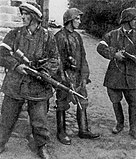
Back الدولة السرية البولندية Arabic Полска нелегална държава Bulgarian Estat Polonès Clandestí Catalan Polský podzemní stát Czech Polnischer Untergrundstaat German Pola Partizana Ŝtato Esperanto Estado secreto polaco Spanish دولت زیرزمینی لهستان Persian Puolan maanalainen valtio Finnish État polonais clandestin French
Polish Underground State Polskie Państwo Podziemne | |||||||||
|---|---|---|---|---|---|---|---|---|---|
| 1939–1945[1][2] | |||||||||
| Motto: "Honor i Ojczyzna" ("Honor and Fatherland") | |||||||||
| Anthem: "Mazurek Dąbrowskiego" (English: "Poland Is Not Yet Lost") | |||||||||
| Status | Government in exile | ||||||||
| Common languages | Polish | ||||||||
| President of the Polish government-in-exile | |||||||||
• 1939–1945 | Władysław Raczkiewicz | ||||||||
| Prime Minister of the Polish government-in-exile | |||||||||
• 1939–1940 (first) | Władysław Sikorski | ||||||||
• 1944-1945 (last) | Tomasz Arciszewski | ||||||||
| Legislature |
| ||||||||
| Historical era | World War II | ||||||||
| 23 April 1935 | |||||||||
| 1 September 1939 | |||||||||
• Provisional Government of National Unity established | 28 June 1945[1][2] | ||||||||
| |||||||||
| Part of a series on the |
Underground State |
|---|
 |
The Polish Underground State (Polish: Polskie Państwo Podziemne, also known as the Polish Secret State)[a] was a single political and military entity formed by the union of resistance organizations in occupied Poland that were loyal to the Government of the Republic of Poland in exile in London. The first elements of the Underground State were established in the final days of the German and Soviet invasion of Poland, in late September 1939. The Underground State was perceived by supporters as a legal continuation of the pre-war Republic of Poland (and its institutions) that waged an armed struggle against the country's occupying powers: Nazi Germany and the Soviet Union. The Underground State encompassed not only military resistance, one of the largest in the world,[b] but also civilian structures, such as justice, education, culture and social services.
Although the Underground State enjoyed broad support throughout much of the war, it was not supported or recognized by the communists and some of the right-wing extremists. The influence of the communists eventually declined amid military reversals (most notably, the failure of the Warsaw Uprising) and the growing hostility of the USSR. The Soviet Union had created an alternative, puppet government in 1944 (the Polish Committee of National Liberation) and ensured it formed the basis of the post-war government in Poland. During the Soviet-backed communist takeover of Poland at the end of the war, many Underground State members were prosecuted as alleged traitors and died in captivity. Abandoned by the Western Allies, finding it impossible to negotiate with the Soviets, and wishing to avoid a civil war, the key institutions of the Underground State dissolved themselves in the first half of 1945.
Ultimately, hundreds of thousands of people were directly involved with various agencies of the Underground State (the estimates for membership in Armia Krajowa alone are often given at approaching half a million people), and they were quietly supported by millions of Polish citizens. The rationale behind the creation of the secret civilian authority drew on the fact that the German and Soviet occupation of Poland was illegal. Hence, all institutions created by the occupying powers were considered illegal, and parallel Polish underground institutions were set up in accordance with Polish law. The scale of the Underground State was also inadvertently aided by the actions of the occupiers, whose attempts to destroy the Polish state, nation, and its culture, including most importantly genocidal policies that targeted Polish citizens, fuelled popular support for the Polish resistance movement and its development.
During the Cold War era, research on the Underground State was curtailed by Polish communist officials, who instead emphasized the role that communist partisans played in the anti-Nazi resistance. Hence, until recently, the bulk of research done on this topic was carried out by Polish scholars living in exile.
© MMXXIII Rich X Search. We shall prevail. All rights reserved. Rich X Search

